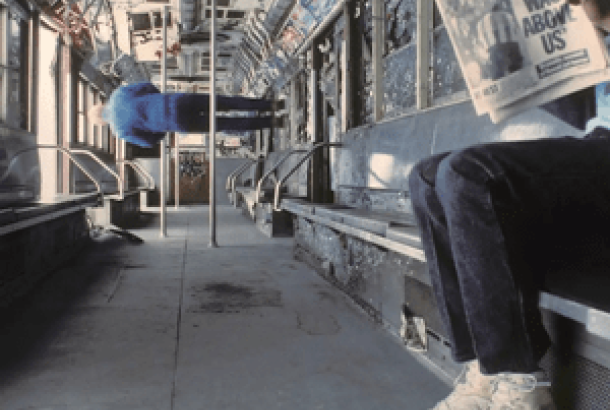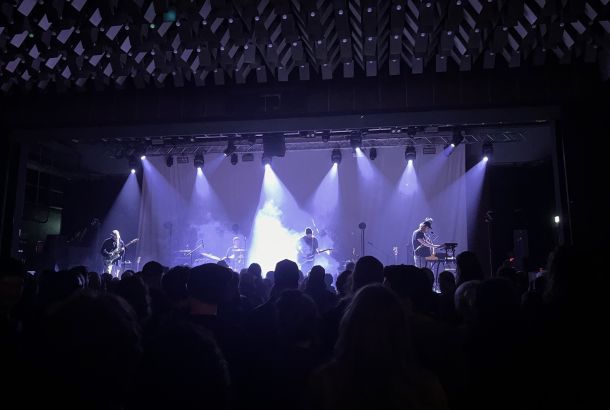Interview: Albert Hammond Jr.
By Dan Whiteley
It’s been an eventful few years for Albert Hammond Jr. – having shot to fame as one fifth of game-changing indie rockers The Strokes in 2001, he’s spent the last half a decade juggling commitments to both the band and his solo efforts. This year alone has seen the release of The Strokes’ hotly anticipated fifth album, Comedown Machine, as well as his own AHJ EP, the latter of which Hammond is currently promoting with a handful of small scale European shows. The Mancunion caught up with him – shortly before his sold out performance at the Northern Quarter’s Night and Day Café – to discuss the past, present and future of his impressive career.
“The Strokes weren’t touring or gonna do anything else in the studio, so it just seemed like a little off-time to do it,” Hammond said of his new release, “I’d already been talking to Julian [Casablancas, Strokes frontman] since he started Cult [Records], like a year or two ago, about releasing fun little things on it, and then from that it turned into releasing an EP. At first it was maybe gonna be a song, just release a digital song or a few throughout the year, but everyone got so excited from the first one that we kinda just went on, and by the fifth one it was like “alright, this is great, let’s just put this out before we keep going and have a record but no time to do anything with it.””
The first single from AHJ, ‘St. Justice’ is a bouncy, undeniably Strokes-y piece of power pop; it wouldn’t sound out of place on one of his band’s more recent albums. Explaining how the track came about, Hammond recalls “it started with just keys, just a pad, so I could sing around it, but then I started doing this guitar thing which then became the whole guitar part over it and made it more interesting, then we took out the pad and all of a sudden it was a different thing. That was fun,” he adds, “when you’re just hanging out in your house and you just push mute, and you look up and the song changes so much. Especially if you listen to it a hundred times at all these different stages.”
Whilst Hammond’s fans have been spoiled with regular new music in one form or another as of late, it’s been five years since they’ve had the chance to see him up close and personal in an intimate setting. The Strokes have toured intermittently playing huge arena and festival shows, most notably in support of their 2011 comeback record Angles, but Hammond’s solo ventures are a whole different ball game. “Every time I come back I almost have to start from scratch,” he admits, “in this business, people come and go so fast that five years without playing a show is a long time to come back and just be like “Hey!”. But I mean, it’s fine, it’s part of the fun. It’s not like I didn’t know it was gonna be like that. It’s part of the process. I even felt it in New York, where we’d built it up to this 1,200 capacity room we sold out, and now we need to start again from 500 a night.”
Comedown Machine, The Strokes’ follow up to the chart topping Angles, was released back in March to little fanfare and was their first not accompanied by any sort of concert tour. When asked if there was a conscious decision to dial back the promotion that time around, Hammond quickly asserts “that was definitely a decision… I don’t think we knew that we weren’t gonna tour, it was just the idea of let’s release this record and not do any press and just see what happens. I mean, the thing is we got to a point where the press – us talking – becomes this circle of just gibberish. It just didn’t feel necessary.” More sheepishly, he then admits “I didn’t want it to come about and everyone be like “oh, was Julian there? Do you not talk to each other anymore?” I’d almost rather have it fail than have to deal with that.”
This year is also a special year for the band and its fans, as it marks the tenth anniversary of the Strokes’ second album Room on Fire, a record Hammond clearly has fond memories of. “To me, I prefer it over Is This It, not to put Is This It down – they’re different and I’m glad they both exist – but if I was gonna grab a Strokes album, it’s always the one I would probably start with.” He explains, “When you’re home and you have the time, it’s nice to listen to a full record, and I got stuck on listening to B sides; like the B side of this Elvis record and the B side of Room on Fire. For some reason I just really liked just putting it on repeat. It felt very comfortable.” Despite his pride in the record, he’s not oblivious to the criticism it has received since its release: “We got a lot of slack, just like “oh, it’s just sounds the same as the first”, but time has made me feel like whatever they wrote about it, they were wrong.” He continues, elaborating on his train of thought, “If they could only write an article about those articles put together, it almost sounds like a crazy person… If you were going out with that span of ten years of articles, you’d wanna get divorced so bad.”
Inevitably, as the conversation winds down, the question of The Strokes’ future crops up, which is met with an elusive, albeit optimistic, reply: “We speak, but we don’t know exactly what we’re gonna do yet, or timing-wise. I always still see us doing stuff – just in my opinion,” he says, “but I don’t know when, where or why.”







